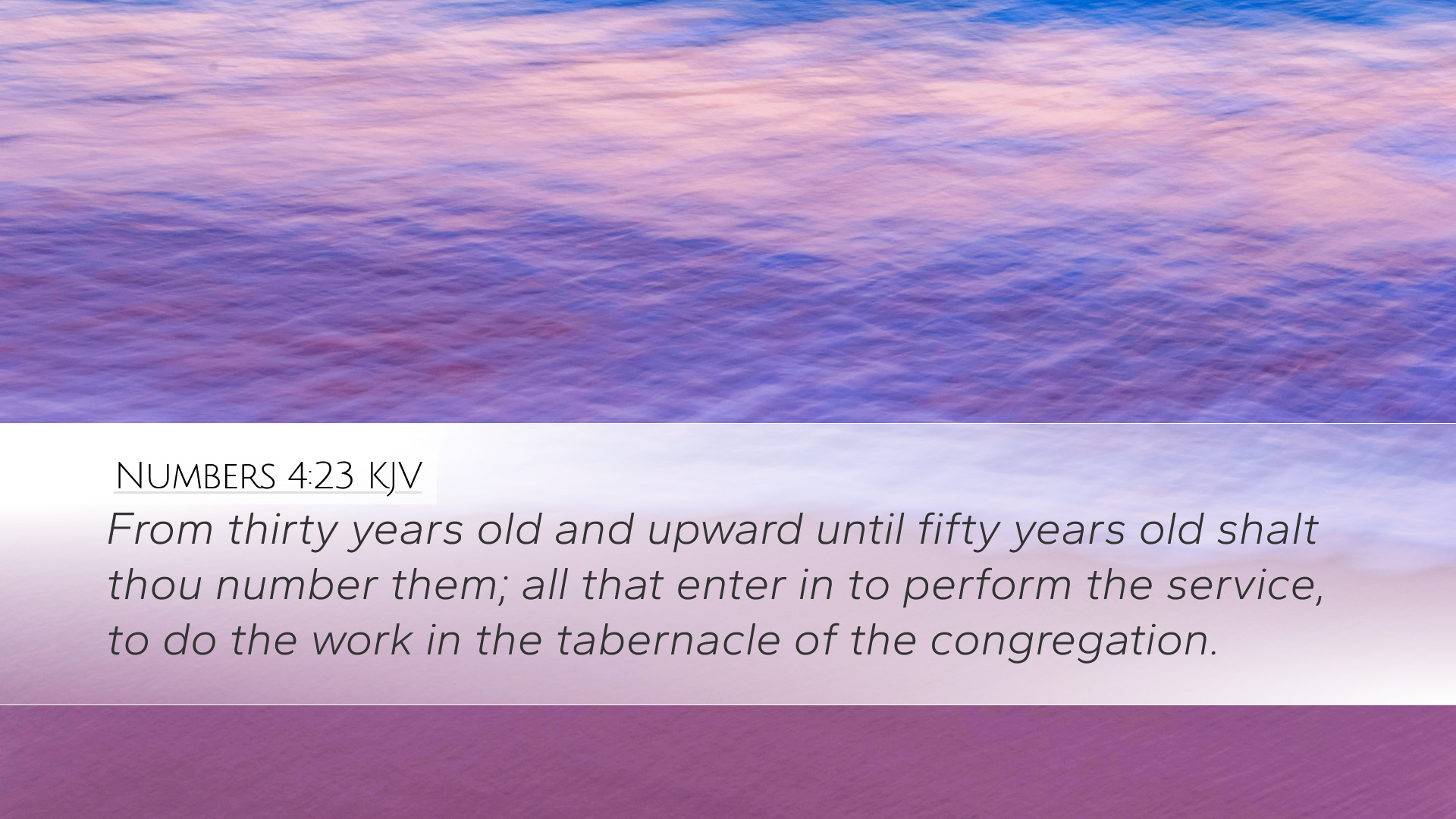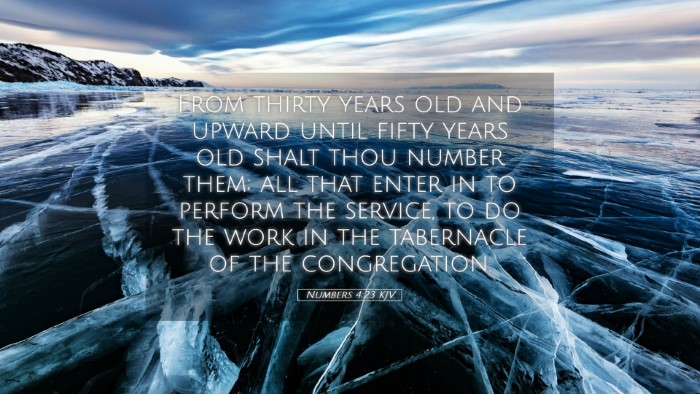Commentary on Numbers 4:23
Verse: "From thirty years old and upward until fifty years old, all that enter into the host, to do the work in the tabernacle of the congregation."
Introduction
This verse is situated within the context of the Levitical ordinances concerning the service in the tabernacle. It specifies the age range of those who are eligible for certain responsibilities associated with the sanctuary. Various commentaries shed light on the significance of these age specifications and their implications for service to God.
Age Significance
Matthew Henry: Henry emphasizes that the age of thirty was considered a significant milestone in Jewish culture, marking the transition to maturity and responsibility. This age was often associated with the time of readiness to assume serious duties, particularly in a spiritual context.
Albert Barnes: According to Barnes, the age range signifies a balance between vigor and wisdom. Those from thirty to fifty were deemed fit to undergo the physical demands of tabernacle duties while still possessing the necessary wisdom and experience to perform those duties effectively.
Adam Clarke: Clarke notes that the age restrictions may reflect God's order and structure within the community. He argues that this organization served both practical and spiritual purposes, allowing for a well-prepared service in the tabernacle.
The Nature of the Service
The text refers to “the work in the tabernacle of the congregation,” which highlights the seriousness and sacredness of the tasks to be undertaken.
Matthew Henry: He points out that serving in the tabernacle was a privilege that entailed a high degree of accountability. The priests and Levites not only served the people but also acted as mediators between them and God.
Albert Barnes: Barnes elucidates that the “work” involved careful attention to detail, signifying that God's work demands diligence and precision. Thus, the selection of mature individuals for this service is paramount.
Responsibilities and Roles
Those within this age bracket were to undertake various responsibilities, reflecting both physical and spiritual labor.
- Priestly Duties: Responsibilities included the rituals and sacrifices necessary for worship.
- Caretaking of the Tabernacle: This involved maintaining the sanctity and cleanliness of the tabernacle, which were paramount for worship.
- Teaching Duties: Mature individuals were often relied upon to instruct the younger generations in the ways of the Lord.
The Divine Order of Service
Albert Barnes: He emphasizes that God's establishment of these age parameters reflects Divine wisdom and order within the community. The structure is vital for clear lines of responsibility and authority.
Matthew Henry: Adding to this idea, Henry suggests that such ordered service promotes stability and prevents chaos in community worship. An orderly house shines forth the attributes of the God who resides therein.
Theological Implications
Adam Clarke: Clarke focuses on the theological implications of this age specification, noting that it reveals God’s wisdom in appointing leaders and workers according to their capabilities and developmental stages.
This establishment of age and role challenges modern congregations to consider how they structure their own leadership and volunteer service. How do we equip and prepare different age groups for service today?
Lessons for Today
The principles underpinning Numbers 4:23 extend beyond the specific cultural and historical context of ancient Israel and into contemporary ecclesiastical settings.
- Maturity in Service: The age specification invites reflection on how maturity, both spiritually and emotionally, is essential in church leadership.
- The Importance of Training: In light of this verse, there is a call for thorough training and preparation for individuals stepping into roles of responsibility within the church.
- Divine Authority: The clear delineation of roles serves as a reminder of God’s sovereignty over His people, and the necessity of submission to His design in our own church structures.
Conclusion
Numbers 4:23 serves not only as a historical guideline for the Levitical duties but also as a timeless teaching that enhances our understanding of responsibility, maturity, and divine order in service to God. For pastors, students, and theologians, it highlights how God thoughtfully appoints individuals for His service and the importance of structured responsibilities within the body of Christ.


